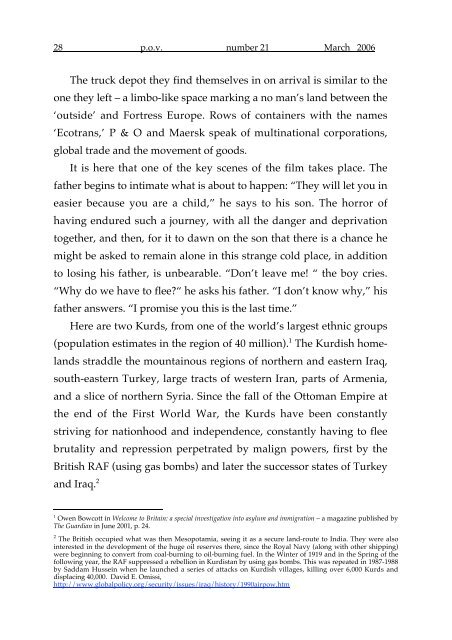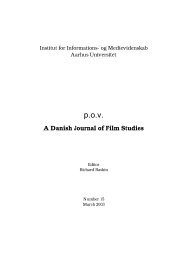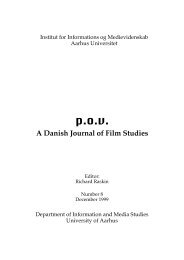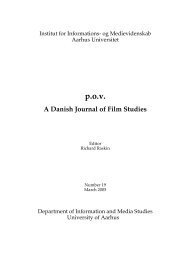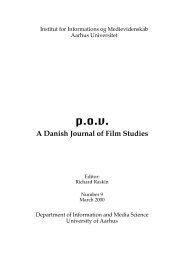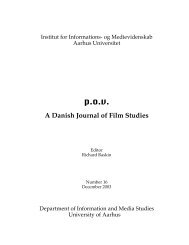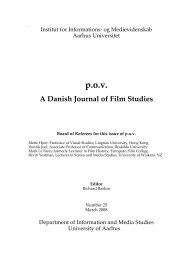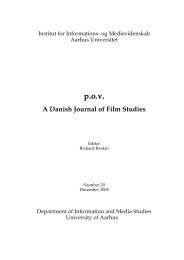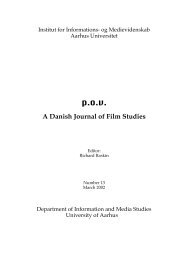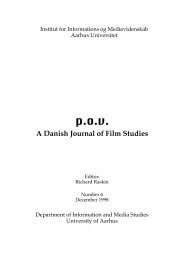Bawke - POV - Aarhus Universitet
Bawke - POV - Aarhus Universitet
Bawke - POV - Aarhus Universitet
You also want an ePaper? Increase the reach of your titles
YUMPU automatically turns print PDFs into web optimized ePapers that Google loves.
28 p.o.v. number 21 March 2006<br />
The truck depot they find themselves in on arrival is similar to the<br />
one they left – a limbo-like space marking a no man’s land between the<br />
‘outside’ and Fortress Europe. Rows of containers with the names<br />
‘Ecotrans,’ P & O and Maersk speak of multinational corporations,<br />
global trade and the movement of goods.<br />
It is here that one of the key scenes of the film takes place. The<br />
father begins to intimate what is about to happen: “They will let you in<br />
easier because you are a child,” he says to his son. The horror of<br />
having endured such a journey, with all the danger and deprivation<br />
together, and then, for it to dawn on the son that there is a chance he<br />
might be asked to remain alone in this strange cold place, in addition<br />
to losing his father, is unbearable. “Don’t leave me! “ the boy cries.<br />
“Why do we have to flee?“ he asks his father. “I don’t know why,” his<br />
father answers. “I promise you this is the last time.”<br />
Here are two Kurds, from one of the world’s largest ethnic groups<br />
(population estimates in the region of 40 million). 1 The Kurdish home-<br />
lands straddle the mountainous regions of northern and eastern Iraq,<br />
south-eastern Turkey, large tracts of western Iran, parts of Armenia,<br />
and a slice of northern Syria. Since the fall of the Ottoman Empire at<br />
the end of the First World War, the Kurds have been constantly<br />
striving for nationhood and independence, constantly having to flee<br />
brutality and repression perpetrated by malign powers, first by the<br />
British RAF (using gas bombs) and later the successor states of Turkey<br />
and Iraq. 2<br />
1 Owen Bowcott in Welcome to Britain: a special investigation into asylum and immigration – a magazine published by<br />
The Guardian in June 2001, p. 24.<br />
2 The British occupied what was then Mesopotamia, seeing it as a secure land-route to India. They were also<br />
interested in the development of the huge oil reserves there, since the Royal Navy (along with other shipping)<br />
were beginning to convert from coal-burning to oil-burning fuel. In the Winter of 1919 and in the Spring of the<br />
following year, the RAF suppressed a rebellion in Kurdistan by using gas bombs. This was repeated in 1987-1988<br />
by Saddam Hussein when he launched a series of attacks on Kurdish villages, killing over 6,000 Kurds and<br />
displacing 40,000. David E. Omissi,<br />
http://www.globalpolicy.org/security/issues/iraq/history/1990airpow.htm


